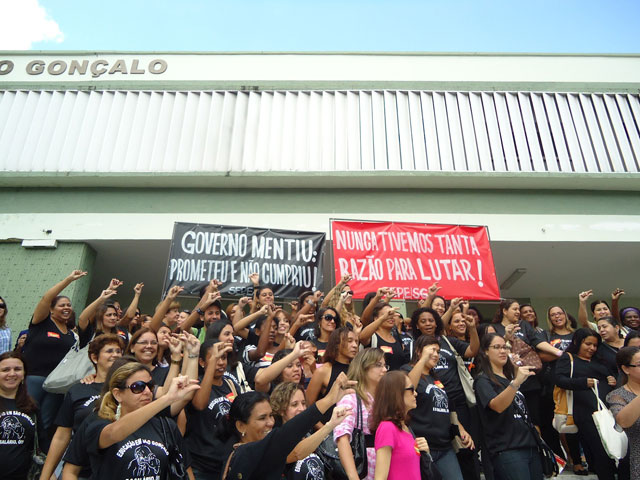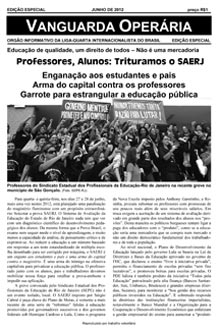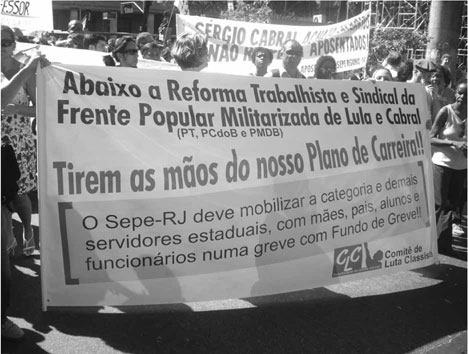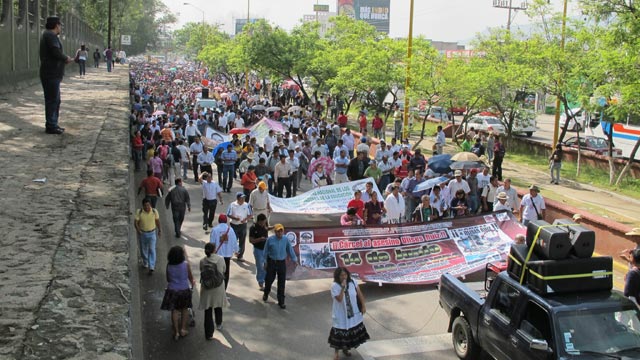
June 2012
Stop Work to Stop High Stakes Test

Teachers of the Teachers Union of the State of Rio de Janeiro (SEPE) during recent strike in the city of
São Gonçalo. (Photo: SEPE-RJ)
The
following article is translated from a
June 2012 supplement to Vanguarda
Operária,
the newspaper of our comrades of the
Liga Quarta-Internacionalista do
Brasil (Fourth Internationalist League
of Brazil). The title of the original
was, “Teachers, Students, Shred the
SAERJ: A Fraud Against Students and
Parents, A Weapon of Capital Against
Teachers, A Noose to Strangle Public
Education.”
 On June 27
and 28, teachers in Rio de Janeiro are
stopping work for an unusual purpose: to
boycott the SAERJ exam. This “Education
Evaluation System of the State of Rio de
Janeiro” has nothing whatsoever to do
with a scientific diagnosis of the
pedagogical development of the students.
Like the national Prova Brasil exam,
this test doesn’t even measure the level
of factual knowledge, much less the
capacity for analysis, critical thought
and ability to express oneself. By
reducing education to a number based on
answers to a standardized
multiple-choice test designed to be
corrected by machine, the SAERJ is a
swindle perpetrated against students and
parents and a weapon of capital against
teachers. It is an arm of the enemy in
the capitalist offensive to privatize
public education. Teachers together with
students, parents and working people
must mobilize our strength to rip up
this fraudulent test and prevent it from
being administered.
On June 27
and 28, teachers in Rio de Janeiro are
stopping work for an unusual purpose: to
boycott the SAERJ exam. This “Education
Evaluation System of the State of Rio de
Janeiro” has nothing whatsoever to do
with a scientific diagnosis of the
pedagogical development of the students.
Like the national Prova Brasil exam,
this test doesn’t even measure the level
of factual knowledge, much less the
capacity for analysis, critical thought
and ability to express oneself. By
reducing education to a number based on
answers to a standardized
multiple-choice test designed to be
corrected by machine, the SAERJ is a
swindle perpetrated against students and
parents and a weapon of capital against
teachers. It is an arm of the enemy in
the capitalist offensive to privatize
public education. Teachers together with
students, parents and working people
must mobilize our strength to rip up
this fraudulent test and prevent it from
being administered.
The walkout called by the Teachers Union of the State of Rio de Janeiro, SEPE, is not an isolated local event. The SAERJ imposed by [Rio state governor] Sérgio Cabral is a key component of his Goals Plan, and only the most recent of a series of failed education “reforms” promoted by successive governors and the federal governments of Henrique Cardoso and Lula. Like the New Schools program of Anthony and Rosinha Garotinho (who governed the state of Rio from 1998 to 2007), it seeks to bribe teachers with promises of a few reais in addition to their wretched salaries. In exchange it demands acceptance of a system of evaluation based largely on students’ scores on high-stakes tests (“provões”). In this way, the bourgeois politicians seek to link the wages of educators to the “product,” as if education were a commodity purchased on the market rather than a fundamental democratic right of working people and the entire population.
At the national level, the Lula administration’s Educational Development Plan (PDE) is based on the earlier Law of Educational Fundamentals and Directives approved by the government of Henrique Cardoso [in 1997], which declared education to be “open to private enterprise,” permitted state financing of “non-profit” private schools, and provided vouchers and scholarships for private schools. Lula’s PDE is also the result of a campaign, “Everyone for Education,” sponsored by high finance (the Santander, Itaú, Unibanco and Bradesco banks) and big companies (Gerdau [steel], Suzano [wood products]), to monitor the “proper management of public resources invested in education.” And above all, it is in response to the directives of the imperialist financial institutions, notably the World Bank and the Organization of Economic Cooperation and Development (OECD), which promote a business model of educational management in order to increase the “productivity” of teachers. This is where the SAERJ exam and other high-stakes tests come from.
In calling a work stoppage of the state school network, the SEPE correctly underscores that these tests blame teachers for the results of “decades of neglect and dismantling of public education.” The lack of investment, the overcrowded classrooms, the inadequate or non-existent computers, laboratories and libraries, teachers’ starvation wages[1] and students’ difficult living conditions are all factors which impinge on the quality of education but are ignored by the SAERJ exam. “Rewarding” or “punishing” teachers and staff on the basis of test scores is not only unjust, not only does it promote cheating, it introduces competition into an undertaking (education) which is inherently collective and collaborative. But the conclusion that the reformist union leadership draws is to suggest to the state education secretary to end bonuses based on “productivity,” open a “discussion” on necessary conditions for a quality education, and construct “a pedagogical policy plan for every school”! This is a recipe for defeat.
 Banner
of the Class-Struggle Committee in
a protest by the SEPE teachers
union says “Down with the Labor
Reform of the Militarized Popular
Front of Lula and Cabral.” (Photo: CLC)
Banner
of the Class-Struggle Committee in
a protest by the SEPE teachers
union says “Down with the Labor
Reform of the Militarized Popular
Front of Lula and Cabral.” (Photo: CLC)
When they broaden the topic, the SEPE leaders criticize “neo-liberalism,” i.e., the “free market” policies that currently dominate bourgeois political economy. But this isn’t a discussion about reforms to improve learning. Nor is it a matter of a policy which could be replaced by another. It is a war of the capitalists to gut public education and privatize it, to demolish teachers unions and intensify the exploitation of teachers. That is why the Class-Struggle Committee (CLC) insists that we have to respond with the weapons of class war. The work stoppage called by the SEPE after previous efforts to boycott the SAERJ is a beginning. The combative Mexican teachers have taken resistance to another level in calling strikes to stop these phony “evaluations.” And because it is an offensive of imperialism, of capitalism in its phase of decay, of systematic destruction of past gains, the reformist trade-unionism of the past no longer works – what’s required is a revolutionary international response.
Commodification of Education: the U.S. Experience
The United States is one of the countries where corporate “reforms” of public education have deepened the most in recent years. Since 1983, at the beginning of the administration of the conservative Ronald Reagan, a study was published under the title, A Nation at Risk: the Imperative of Educational Reform. This report was supported by the two partner parties of American capitalism, Democrats and Republicans, which with regard to education are truly twins. Posing the issue in terms of national security during that period of anti-Soviet Cold War, it placed the blame for the failings of the public schools on the shoulders of the teachers. It called for educators’ salaries to be “professionally competitive, market-sensitive and performance-based.” Ever since, the onslaught against teachers, and their unions in particular, hasn’t let up for a minute.
Nevertheless, the professional teacher-bashers are frustrated in the face of the strength of teacher unionism, one of the few solid sectors of a badly weakened union movement.[2] Recently there has been an increase of resistance by education activists against the attacks of the government, particularly over the closing of “failed” schools. This racist policy has brought teachers closer together with the black and Latino neighborhoods affected by this operation of tearing down public education. At the same time there is growing opposition to the system of educational evaluation by means of “high-stakes testing” that harms teachers and students alike.
One of the most prominent figures in this opposition is historian Diane Ravitch, former assistant secretary of education in the administration of George Bush I. Her critique of the effects of this policy of standardized tests, holding teachers responsible for students’ scores and closing schools is all the more influential because until a few years ago she was one of the most prominent defenders and proponents of this same program of corporate educational reform. The SEPE is circulating an interview with Ravitch with the newspaper O Estado de S. Paulo (2 August 2010) where she criticized: “The administration of President Obama continues to accept the punitive approach which began with the Bush government. Privatizing schools negatively affects the public education system…. And making the teachers responsible is being used in order to destroy them.”
For Ravitch and many educators, it is enough to detail these counterproductive results. But for the architects of these “reforms,” for the capitalist governments that implement them and for the imperialist financial agencies that promote them, the educational outcome is utterly beside the point. The intention is not to improve “education for everyone” – that’s only the sales pitch. The advocates of the commmodification of education – the executives of the Business Roundtable, or “philanthropists” like Bill Gates of Micrososft, or the Walton family of WalMart – want to kick the present teachers out of the profession, get rid of teachers unions, slash the cost of education to the treasury and turn public schools into profit platforms (by means of contracts, public-private partnerships) and centers of labor force training for employers. Quality education would be restricted to the sons and daughters of the bourgeoisie and upper middle class.
Beyond the critiques, anyone who really wants to defend public schools and fight for quality education for all must ask themselves what must be done to defeat this assault. If in Rio de Janeiro, the SEPE is taking a step forward in resisting by calling the work stoppage of June 27-28, the teachers unions in the United States, the American Federation of Teachers (AFT) and National Education Association (NEA), shamefully capitulate before the corporate onslaught. They accept that tests be used as the basis for teacher evaluations, only trying to limit them to 40% of the points. Union oppositionists are calling for a boycott of the tests by the parents, individually, a tactic that is doomed to failure. Now they are circulating a petition calling on local, state and federal governments to “reexamine the evaluation system of public schools” and to “develop a system based on multiple forms of assessment which does not require extensive standardized testing….”
 Class Struggle Education
Workers protest against closing
schools, April 26.
Class Struggle Education
Workers protest against closing
schools, April 26.
(Internationalist
photo)
In both cases, of the union bureaucracy and the reformist opposition, their proposals reflect the illusion that we are engaged in a conversation about how to improve education. In contrast, our comrades of Class Struggle Education Workers (CSEW), an opposition tendency in the New York education unions, call for occupying closing schools by teachers, students and parents, and have argued for the union to mobilize its forces to stop the administration of these tests, if necessary by strike action. (It is illegal in the state of New York for teachers to strike for any reason.) And while the bureaucracy and oppositionists in their overwhelming majority supported the Democratic Party candidate Barack Obama in 2008, the CSEW, politically linked to the Internationalist Group, U.S. section of the League for the Fourth International, called to support neither of the two capitalist parties and to fight for a class-struggle workers party.
Combative Union Struggle in Mexico
The policy of the CSEW might seem rather “advanced” in the context of the United States, but in Mexico it has actually been carried out recently in combative strikes. In the states of Chiapas, Oaxaca, Guerrero and Michoacán, tens of thousands of teachers mobilized to prevent the administration of a national high-stakes test of students (the ENLACE) and the “Universal Evaluation” of teachers’ knowledge. Not only did they stop educational activity, shutting down the schools, unionists occupied state education departments and, as a precaution, placed the warehouses where the exams were being stored under guard. In three of the states they forced the governors to sign agreements to not administer the tests, and in Oaxaca, where tens of thousands of teachers occupied the center of the capital for two weeks, teams of some 500 unionists sent out patrols to places where exams might be held to ensure that they did not take place.
In Mexico, the National Education Workers Union (SNTE) is not a workers union but an organ of the state to control teachers. It is one of the main “corporatist” pseudo-unions left over from the regime of the state party, the Institutional Revolutionary Party (PRI), similar in their integration into the capitalist state to the “pelego” (state-controlled) unions in Brazil under the bonapartist Estado Novo of Getúlio Vargas (1931-45, 1951-54) or the military dictatorship (1964-85). The current “leader for life” of the SNTE, Elba Esther Gordillo, was installed as president of the organization in 1989 (and her predecessor, Carlos Jonguitud, was removed) by the president of the republic, Carlos Salinas de Gortari, in a private meeting. Under Jonguitud and Gordillo, “union” gunmen murdered well over 100 members of the organization. Currently, the SNTE is supporting an “Agreement for Quality Education” (ACE), which includes the ENLACE test and the “Universal Evaluation” of the teachers.
Fighting against the charro
(state-imposed) bureaucrats of the SNTE,
an opposition current arose in the
1980s, the National Coordinating
Committee of Education Workers (CNTE),
which today and for many years has
controlled the state federations of the
SNTE in Chiapas, Guerrero,
Michoacán and Oaxaca, along with
a considerable presence in the federal
district (Mexico City) and other states.
The CNTE acts as an independent
organization, calling for extended
strikes of up to a half million
teachers. Section 22 of the SNTE-CNTE in
Oaxaca was the main force behind the
turbulent revolt which kicked the
governor, the police and other
repressive bodies out of the state
capital for more than five months in
2006. In 2012, Section 22, after a march
of 50,000 teachers on May 15, went out
on an unlimited strike on May 21. Tens
of thousands of teachers occupied 20
blocks in downtown Oaxaca. A week later,
the CNTE called a national strike to
oppose implementation of the ACE “and
all of its programs.”.

15,000 demonstrators
in march called by the
dissident teachers of
Section 22 SNTE-CNTE in
Oaxaca on
June 14 to commemorate the
repression and resistance
of 2006. (Photo:
Sección XXII,
SNTE-CNTE)
In Oaxaca, the strike lasted two and a half weeks, resulting in the state government agreeing to all the teachers’ demands. The ACE was cancelled, as was the ENLACE and the teacher evaluation, financing was agreed upon on alternative programs negotiated with Section 22. In Chiapas, the governor also agreed to cancel the student exam. In that state as well as Guerrero and Michoacán, where the mobilization of the dissident teachers was weaker than in Oaxaca, they were able to close between 25% and 50% of the schools. But the teachers were able to block the student exams and in some cases the teacher evaluations by occupying the state education departments and the warehouses where the teachers “guarded” the examination booklets. After a month of massive mobilizations, Mexico’s secretary of gobernación (interior minister) agreed to negotiate about the evaluation with the teachers.
The considerable power of mobilization, the militancy and tenacity of the dissident teachers of the CNTE in confronting the capitalist state are obvious. In the midst of the campaign for the July 1 elections, the press and television channels almost unanimously are constantly condemning the teachers in struggle. (In contrast, they have given very favorable coverage to the new movement of petty-bourgeois students, #YoSoy132, who are calling for clean elections.) Yet the unions which are (organizationally) “independent” of corporatist control remain politically subordinated to the bourgeoisie. Today, as in 2006, the CNTE is calling in effect to vote for the candidate of the opposition popular front, Andrés Manuel López Obrador, even though his supporters in the Party of the Democratic Revolution (PRD) supported the bloody repression in Oaxaca in 2006 and today join the chorus of criticism of the teachers.
Our comrades of the Grupo Internacionalista in Mexico, in contrast to the #YoSoy132 movement, are calling for no vote in the elections, opposing all the bourgeois candidates, parties and coalitions. They defend the CNTE teachers and join in their mobilizations. They call, as do the CLC in Brazil and the CSEW in the United States, for control of the schools by assemblies of teachers, students, staff and parents. It is such elected bodies that should evaluate the efforts of the students and teachers, and not some capitalist authorities who are out to destroy the unions and subjugate public education to the orders of capital. We insist: Sérgio Cabral, Lula, capitalists and imperialists, keep your hands off our schools! We educate, we decide!
The Liga Quarta-Internacionalista do Brasil, together with the Internationalist Groups in México and the U.S., seek to build the nucleus of a revolutionary workers party, Leninist and Trotskyist, that fights for international socialist revolution, the precondition for achieving an education that is genuinely in the service of the working people and the oppressed. ■To contact the Internationalist Group and the League for the Fourth International, send e-mail to: internationalistgroup@msn.com